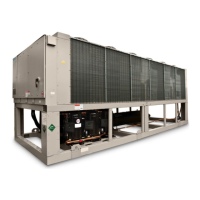OMM 1166-1 AGZ 025D through 190D 5
Glycol Solutions
The use of a glycol/water mixture in the evaporator to prevent freezing reduces system capacity and
efficiency, as well as increase pressure drop. The system capacity, required glycol solution flow rate,
and pressure drop with glycol may be calculated using Table 1.
1. Capacity – Multiply the capacity based on water by the Capacity correction factor from Table 2
through Table 5.
2. Flow – Multiply the water evaporator flow by the Flow correction factor from Table 2 through
Table 5 to determine the increased evaporator flow due to glycol.
If the flow is unknown, it can be calculated from the following equation
3. Pressure drop -- Multiply the water pressure drop from page 9 by Pressure Drop correction factor
from Table 2 through Table 5. High concentrations of propylene glycol at low temperatures can
cause unacceptably high pressure drops.
4. Power -- Multiply the water system power by Power correction factor from Table 2 - Table 5.
Test coolant with a clean, accurate glycol solution hydrometer (similar to that found in service
stations) to determine the freezing point. Obtain percent glycol from the freezing point tables below.
It is recommended that a minimum of 25% solution by weight be used for protection against corrosion
or that additional compatible inhibitors be added.
Concentrations above 35 % do not provide any additional burst protection and should be carefully
considered before using.
Table 1, Flow/Tons/Delta-T Relationship
FactorCorrectionFlow
TDelta
glycolCapacityTons
)(24
FactorCorrectionFlow
TDelta
CapacitykW
18.4
Do not use an automotive grade antifreeze. Industrial grade glycols must be used. Automotive
antifreeze contains inhibitors which will cause plating on the copper tubes within the chiller evaporator.
The type and handling of glycol used must be consistent with local codes
Table 2, Ethylene Glycol Factors for Models AGZ 025D to 130D
Table 3, Propylene Glycol Factors for Models AGZ 025D to 130D

